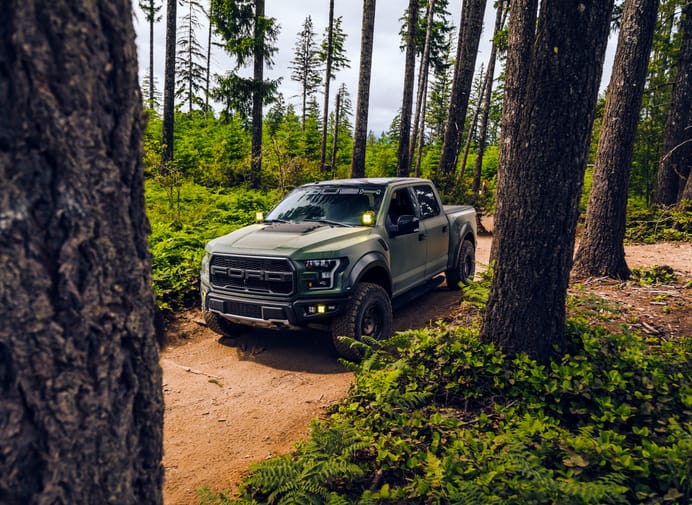The Evolution of Pickup Trucks: Comparing the 1990s Workhorses to Today's Tech-Savvy Machines

Pickup trucks have long been a symbol of American ingenuity and utility. From rugged farmhands to stylish city cruisers, these versatile vehicles have adapted and evolved alongside our changing needs. Today's pickups bear little resemblance to their 1990s counterparts, boasting advancements in technology, comfort, and capability. Let's take a deep dive into the transformation of pickup trucks, comparing the iconic workhorses of the 90s with the feature-laden machines of today.
From Function to Form: A Shift in Design Philosophy
The 1990s pickup truck scene was dominated by function over form. Boxy silhouettes, chrome accents, and prominent grilles prioritized utility and a macho image. Interiors were basic, with vinyl seats, minimal technology, and a focus on durability. Popular models like the Ford F-150, Dodge Ram, and Chevrolet Silverado prioritized hauling and towing capacity, making them ideal companions for work crews and outdoor enthusiasts.
Today's pickup trucks have embraced a more sculpted aesthetic. While retaining their ruggedness, they incorporate design elements from SUVs and even luxury cars. Streamlined bodies, LED lighting, and two-tone paint jobs create a more sophisticated look. Interiors have undergone a dramatic transformation, featuring premium materials, leather upholstery, and advanced infotainment systems. These modern pickups cater to a broader audience, appealing to not just traditional truck buyers, but also families and urban dwellers seeking a blend of capability and comfort.
The Rise of the Powertrain: From Gas Guzzlers to Eco-Conscious Options
The 1990s saw the reign of large, naturally-aspirated V8 engines. These engines offered impressive towing capacity but came at the expense of fuel efficiency. Concerns about rising fuel costs and environmental impact were only just beginning to emerge. As a result, fuel economy wasn't a major selling point for pickup trucks.
The 21st century has brought a revolution in pickup powertrains. Manufacturers have embraced a variety of options, including smaller, more fuel-efficient turbocharged engines, V6 configurations, and even hybrid and electric powertrains. This wider range caters to a more diverse set of needs. While V8s continue to be offered for those demanding maximum power, eco-conscious buyers have more choices than ever before. The Ford F-150 Hybrid, for instance, offers impressive fuel savings without sacrificing too much towing capacity.
Technological Transformations: From Basic Radios to Rolling Tech Centers
The 1990s pickup truck offered minimal technological intervention. AM/FM radios, cassette players, and rudimentary climate control systems were the norm. Safety features were limited to airbags and anti-lock brakes.
Today's pickup trucks are rolling tech centers. Advanced infotainment systems with large touchscreens, smartphone integration, and Wi-Fi hotspots are commonplace. Advanced driver-assistance systems (ADAS) like lane departure warning, blind-spot monitoring, and adaptive cruise control enhance safety and reduce driver fatigue. Features like surround-view cameras and parking sensors make maneuvering these larger vehicles a breeze. These technological advancements cater to a generation accustomed to connectivity and a focus on safety.
Beyond Capability: The Rise of Specialization
The 1990s pickup truck was a one-size-fits-all proposition. While different trim levels offered some variation, the overall focus remained on providing a general-purpose utility vehicle.
Today's pickup truck market offers a wide range of specialized options. From off-road beasts like the Ford Raptor to luxury cruisers like the Ram TRX, there's a pickup for nearly every niche. Mid-size trucks like the Ford Ranger and Chevrolet Colorado cater to those seeking a more maneuverable option. Electric pickups like the Rivian R1T offer a combination of eco-friendliness and impressive performance. This specialization reflects the diverse needs and lifestyles of modern truck buyers.
The Future of Pickup Trucks: Embracing Innovation
The evolution of pickup trucks is far from over. The future promises even more innovation, with advancements in electrification, autonomous driving technology, and connected vehicle platforms. Here are some exciting possibilities on the horizon:
- Full Electric Dominance: Electric pickups are poised to become a major force in the market. With increasing battery range and powerful electric motors, these trucks could offer the best of both worlds: capability and sustainability.
- Autonomous Driving Features: Self-driving technology could transform pickup trucks into capable work companions, allowing for hands-free operation during hauling or towing tasks.
- Connected Vehicle Revolution: Connected car technology will integrate pickups seamlessly into a digital ecosystem, allowing for remote monitoring, over-the-air updates, and enhanced safety features.
Conclusion: A Pickup Truck for Every Need
Pickup trucks have come a long way since the 1990s. They have transformed from utilitarian workhorses into sophisticated machines that cater to a wide range of lifestyles. This evolution reflects not only advancements in technology and engineering but also a deeper understanding of the ever-changing needs of truck buyers. Whether you're a contractor hauling heavy equipment, a family seeking a comfortable and capable adventure vehicle, or an environmentally conscious commuter, there's a pickup truck perfectly suited for you. The future of pickup trucks promises even more exciting possibilities, with the potential for electric dominance, autonomous driving features, and a fully connected car experience. As pickup trucks continue to evolve, one thing remains constant: their enduring appeal as a symbol of American ingenuity and a testament to our ever-growing desire for vehicles that can take us wherever life's adventures may lead.
